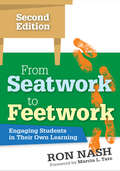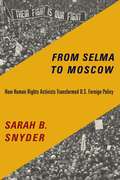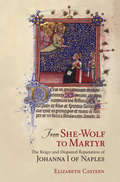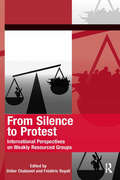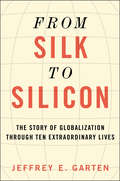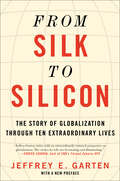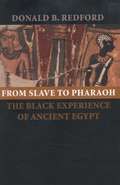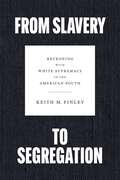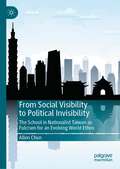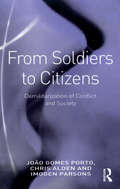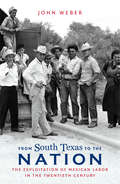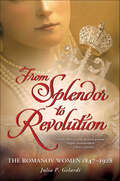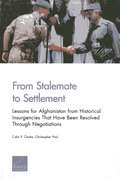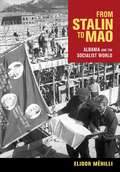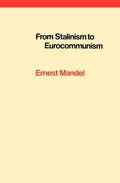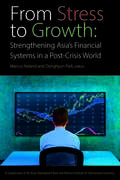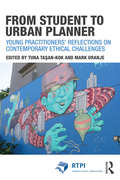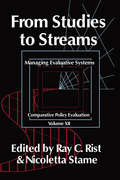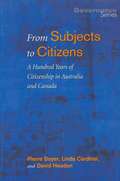- Table View
- List View
From Seatwork to Feetwork: Engaging Students in Their Own Learning
by Ronald J. NashThe essential book on student engagement—now fully updated! Ron Nash’s bestseller has helped thousands of teachers to transform their classroom environments by energizing and engaging their students. In this newly revise edition, Nash offers proven strategies to involve students as active participants in their own learning. Teachers of all levels will benefit from: The latest research on exercise, learning, and brain development New chapters on the value of empathy and the use of feedback versus praise Even more classroom examples at all levels Novel teaching strategies that align with the Speaking and Listening Skills requirements of the Common Core State Standards
From Selma to Moscow: How Human Rights Activists Transformed U.S. Foreign Policy
by Sarah B. SnyderThe 1960s marked a transformation of human rights activism in the United States. At a time of increased concern for the rights of their fellow citizens—civil and political rights, as well as the social and economic rights that Great Society programs sought to secure—many Americans saw inconsistencies between domestic and foreign policy and advocated for a new approach. The activism that arose from the upheavals of the 1960s fundamentally altered U.S. foreign policy—yet previous accounts have often overlooked its crucial role.In From Selma to Moscow, Sarah B. Snyder traces the influence of human rights activists and advances a new interpretation of U.S. foreign policy in the “long 1960s.” She shows how transnational connections and social movements spurred American activism that achieved legislation that curbed military and economic assistance to repressive governments, created institutions to monitor human rights around the world, and enshrined human rights in U.S. foreign policy making for years to come. Snyder analyzes how Americans responded to repression in the Soviet Union, racial discrimination in Southern Rhodesia, authoritarianism in South Korea, and coups in Greece and Chile. By highlighting the importance of nonstate and lower-level actors, Snyder shows how this activism established the networks and tactics critical to the institutionalization of human rights. A major work of international and transnational history, From Selma to Moscow reshapes our understanding of the role of human rights activism in transforming U.S. foreign policy in the 1960s and 1970s and highlights timely lessons for those seeking to promote a policy agenda resisted by the White House.
From She-Wolf to Martyr: The Reign and Disputed Reputation of Johanna I of Naples
by Elizabeth CasteenIn 1343 a seventeen-year-old girl named Johanna (1326–1382) ascended the Neapolitan throne, becoming the ruling monarch of one of medieval Europe's most important polities. For nearly forty years, she held her throne and the avid attention of her contemporaries. Their varied responses to her reign created a reputation that made Johanna the most notorious woman in Europe during her lifetime. In From She-Wolf to Martyr, Elizabeth Casteen examines Johanna's evolving, problematic reputation and uses it as a lens through which to analyze often-contradictory late-medieval conceptions of rulership, authority, and femininity. When Johanna inherited the Neapolitan throne from her grandfather, many questioned both her right to and her suitability for her throne. After the murder of her first husband, Johanna quickly became infamous as a she-wolf—a violent, predatory, sexually licentious woman. Yet, she also eventually gained fame as a wise, pious, and able queen. Contemporaries—including Francesco Petrarch, Giovanni Boccaccio, Birgitta of Sweden, and Catherine of Siena—were fascinated by Johanna. Drawing on a wide range of textual and visual sources, Casteen reconstructs the fourteenth-century conversation about Johanna and tracks the role she played in her time’s cultural imaginary. She argues that despite Johanna’s modern reputation for indolence and incompetence, she crafted a new model of female sovereignty that many of her contemporaries accepted and even lauded.
From Silence to Protest: International Perspectives on Weakly Resourced Groups (The\mobilization Series On Social Movements, Protest, And Culture Ser.)
by Frédéric Royall Didier ChabanetThe editors of this book examine social movement scholars’ use of contemporary concepts and paradigms in the study of protest as they analyse the extent to which these tools are valid (or not) in very different regional - and thus political or cultural - contexts. The authors posit that ’weakly resourced groups’ are a particularly useful point of departure to evaluate the strengths and weaknesses of three key social movement schools of analysis: resource mobilization, political opportunity structures, and frame analysis. Some of the groups considered in this volume are financially disadvantaged, lacking money and work; others are economically disadvantaged, with members having precarious, part-time, or short-term jobs; some are socially disadvantaged, with fragile networks of solidarity; others are culturally disadvantaged, with members continuously victimized, stigmatized and rejected; finally some are politically disadvantaged when they have little or no access to decision-making structures. These exclusionary factors can be cumulative and give way to different outcomes. The chapters cover a large range of examples including urban riots in France and in Great Britain, the World Social Forums of Dakar and Nairobi, the struggles of precarious workers in Italy and Greece, unemployed mobilization in Germany and Ireland, the mobilization of the Roma and Muslims in Europe, the Brazilian landless movement, the mobilization of small farmers in France, as well as mobilization in authoritarian states such as Morocco and Cuba. This book will be of interest to scholars, students and activists working within social movement studies.
From Silk to Silicon
by Jeffrey E. GartenThe story of globalization, the most powerful force in history, as told through the life and times of ten people who changed the world by their singular, spectacular accomplishments.This is the first book to look at the history of globalization through the lens of individuals who did something transformative, as opposed to describing globalization through trends, policies, or particular industries. From Silk to Silicon tells the story of who these men and women were, what they did, how they did it and how their achievements continue to shape our world today. They include:* Genghis Khan, who united east and west by conquest and by opening new trade routes built on groundbreaking transportation, communications, and management innovations.* Mayer Amschel Rothschild, who arose from an oppressive Jewish ghetto to establish the most powerful bank the world has seen, and ushered in an era of global finance.* Cyrus Field, who became the father of global communications by leading the effort to build the transatlantic telegraph, the forerunner to global radio, TV, and the worldwide Internet.* Margaret Thatcher, whose controversial policies opened the gusher of substantially free markets that linked economies across borders.* Andy Grove, a Hungarian refugee from the Nazis who built the company--Intel--that figured out how to manufacture complex computer chips on a mass, commercial scale and laid the foundation for Silicon Valley's computer revolution.Through these stories Jeffrey E. Garten finds the common links between these figure and probes critical questions including: How much influence can any one person have in fundamentally changing the world? And how have past trends in globalization affected the present and how will they shape the future? From Silk to Silicon is an essential book to understanding the past--and the future--of the most powerful force of our times.y did each leave? What do their stories tell us about globalization today? What do they imply for the future?With the Internet tying the world together in ways that would have been unfathomable just a few years ago, with the economic ups and downs of China and other emerging nations whipsawing international markets, and with terrorism causing the largest flows of refugees since the end of World War II, a fresh way of thinking about globalization could not be more urgent. That is exactly what From Silk to Silicon provides.Praise for From Silk to Silicon"This is a tale of globalization and leadership that is both sweeping and personal. By focusing on ten transformational people, it shows how individuals can affect the flow of history. It's a guide to the future as well as to the past."--Walter Isaacson, author of Steve Jobs, Einstein, and Benjamin Franklin"From Silk to Silicon creatively combines the impersonal forces of globalization with the very personal faces of biography in an engaging and thought-provoking story. Ranging over eight centuries of empires, exploration, and enterprise, Garten's colorful histories portray how willpower and persistence can propel societies to new achievements--and he says the best is yet to come!"--Robert B. Zoellick, former president of the World Bank"Impressive, fascinating, and very creative. Jeffrey Garten draws on decades of experience in the modern world economy to tell the story of globalization and, in so doing, not only brings the creation of our present world into focus but also widens our understanding of how the world may well evolve in the future."--Daniel Yergin, Pulitzer Prize-winning author of The Prize"Jeffrey Garten has brilliantly updated Thomas Carlyle's Great Man theory of history in his gallery of transformative figures, notably including a woman, who have spurred globalization. A tour de force--imaginative, informative, and just plain fun to read."--Strobe Talbott, president of the Brookings Institution"From Silk to Silicon is a most nifty work, as well as being serious history. Garten persuasively shows how, in the broad unfolding of events that brought us from the Dark Ages to the twenty-first century, ind...
From Silk to Silicon: The Story of Globalization Through Ten Extraordinary Lives
by Jeffrey E. GartenStories of ten historical figures who helped build the long road to globalization, from Genghis Khan to an Intel CEO: “Filled with brilliant vignettes.” —The Washington PostThis is the story of globalization, the most powerful force in history, as told through the lives and times of ten people who established new connections between people and nations—whether that was their primary goal or not. Rather than focusing on trends, policies, or particular industries, From Silk to Silicon views the topic of globalization for the first time through the lens of individuals and their transformative actions. It tells us who these men and women were, what they did, how they did it, and how their achievements continue to shape our world today. You’ll read about Genghis Khan, who united east and west by conquest and by opening new trade routes built on groundbreaking transportation, communications, and management innovations; Mayer Amschel Rothschild, who escaped the ghetto and ushered in an era of global finance; Cyrus Field, who led the effort to build the transatlantic telegraph; Margaret Thatcher, whose controversial policies opened the gusher of substantially free markets that linked economies across borders; Andy Grove, a Hungarian Holocaust survivor who, at Intel, laid the foundation for Silicon Valley’s computer revolution; and more.Economist Jeffrey E. Garten finds the common links between these figures and probes critical questions including: How much influence can any one person have in fundamentally changing the world? How have past trends in globalization affected the present? And how will they shape the future? “Fascinating and illuminating.” —Fareed Zakaria, author of Age of Revolutions“Garten has brilliantly updated Thomas Carlyle’s Great Man theory of history . . . A tour de force, imaginative, informative and just plain fun to read.” —Strobe Talbott, former Deputy Secretary of State“A terrific book on globalization . . . really compelling.” —Thomas L. Friedman, author of The World is Flat
From Slave to Pharaoh: The Black Experience of Ancient Egypt
by Donald B. RedfordIn From Slave to Pharaoh, noted Egyptologist Donald B. Redford examines over two millennia of complex social and cultural interactions between Egypt and the Nubian and Sudanese civilizations that lay to the south of Egypt. These interactions resulted in the expulsion of the black Kushite pharaohs of the Twenty-fifth Dynasty in 671 B. C. by an invading Assyrian army. Redford traces the development of Egyptian perceptions of race as their dominance over the darker-skinned peoples of Nubia and the Sudan grew, exploring the cultural construction of spatial and spiritual boundaries between Egypt and other African peoples. Redford focuses on the role of racial identity in the formulation of imperial power in Egypt and the legitimization of its sphere of influence, and he highlights the dichotomy between the Egyptians' treatment of the black Africans it deemed enemies and of those living within Egyptian society. He also describes the range of responses-from resistance to assimilation-of subjugated Nubians and Sudanese to their loss of self-determination. Indeed, by the time of the Twenty-fifth Dynasty, the culture of the Kushite kings who conquered Egypt in the late eighth century B. C. was thoroughly Egyptian itself. Moving beyond recent debates between Afrocentrists and their critics over the racial characteristics of Egyptian civilization, From Slave to Pharaoh reveals the true complexity of race, identity, and power in Egypt as documented through surviving texts and artifacts, while at the same time providing a compelling account of war, conquest, and culture in the ancient world.
From Slavery to Segregation: Reckoning with White Supremacy in the American South
by Keith M. FinleyKeith M. Finley’s From Slavery to Segregation explores the key features shaping southern politics during the nineteenth and twentieth centuries as explained in the South’s defense of its racial systems. It treats slavery and segregation as part of the same whole rather than as discrete institutions rooted in different periods. In the process, the book uncovers the deep historical origins of the region’s states’ rights philosophy and the unfortunate persistence of a culture dominated by calls for white supremacy. While highlighting the broad overview of southern racial and political thought, Finley underscores the larger American struggle with racial injustice, which, although most pronounced in the South, afflicted the entire nation. The South’s defense of chattel slavery became a natural model for the region’s defense of segregation during the Jim Crow era. Through a comparative analysis of the rhetoric employed in the justification of both racial institutions, Finley reveals elements of continuity and change in the region’s identity. Ultimately, he shows how the history of the twentieth-century South is irreparably linked to the century before it. For instance, one cannot understand the ferocity of resistance to the Supreme Court’s 1954 Brown v. Board decision without being aware of how and why the South emerged as it did after the Civil War. The Old South and the New South shared a similar constellation of ideas that informed arguments advancing their respective race-based social orders, which took the form of a commonality of perception regarding race, a sense of being assailed by outsiders, and a series of appeals to the highest secular authority in the pantheon of regional and American beliefs—the Constitution. Discontinuity, however, marked the long-term strategies of both the prewar and postwar South. Although segregationists sought to preserve the racial status quo as did their forebears, they ultimately relented when confronted with federal power and grudgingly shifted toward a narrative that less often foregrounded race when championing states’ rights.
From Slavery to the Cooperative Commonwealth
by Alex GourevitchThis book reconstructs how a group of nineteenth-century labor reformers appropriated and radicalized the republican tradition. These "labor republicans" derived their definition of freedom from a long tradition of political theory dating back to the classical republics. In this tradition, to be free is to be independent of anyone else's will - to be dependent is to be a slave. Borrowing these ideas, labor republicans argued that wage laborers were unfree because of their abject dependence on their employers. Workers in a cooperative, on the other hand, were considered free because they equally and collectively controlled their work. Although these labor republicans are relatively unknown, this book details their unique, contemporary, and valuable perspective on both American history and the organization of the economy.
From Social Visibility to Political Invisibility: The School in Nationalist Taiwan as Fulcrum for an Evolving World Ethos
by Allen ChunThis book began as a year-long ethnography of a school in Taiwan in 1991 then evolved more into a historical sociology of national formation and its cultural mindset. Cultural nationalism is a widely debated but poorly understood process. Contrary to prevailing perceptions, the Cold War may have given way to a more progressive open society, but the politicization of ethnicity hardened a more deeply entrenched cultural frame of mind. Instead of liberating an indigenous reality, Taiwanese consciousness has ironically polarized the political dead ends of reunification and independence. In the final analysis, the ethnography can serve as a paradigmatic case study for critical cultural studies. There are clear ramifications also for a comparative study of the cultural politics of other Chinese speaking or Asian societies and their histories.
From Soldiers to Citizens: Demilitarization of Conflict and Society (Iss Monograph Ser. #No. 130)
by Chris Alden João Gomes PortoDemilitarization of conflict and society is crucial to building sustainable peace in countries emerging from the scourge of civil war. As longstanding conflicts come to an end, processes which facilitate the potentially volatile transition from formal peace to social peace are critically important. At the heart of the exercise is the necessity of transforming the culture and the instruments of war - demilitarization - including disarming, demobilizing and reintegrating (DDR) former combatants into society. This volume represents the first in-depth and comprehensive discussion of reintegration of former combatants in war to peace transitions. In addition to a systematic reflection and review of existing literature on DDR, the authors devised and applied a field research methodology to studying the reintegration of former combatants in Angola with potentially significant implications on the design and implementation of DDR programmes. The volume is written for academics, students and practitioners focusing on war to peace transitions and post-conflict issues.
From Solidarity to Geopolitics
by Tsveta PetrovaThis book theorizes a mechanism underlying regime-change waves, the deliberate efforts of diffusion entrepreneurs to spread a particular regime and regime-change model across state borders. Why do only certain states and nonstate actors emerge as such entrepreneurs? Why, how, and how effectively do they support regime change abroad? To answer these questions, the book studies the entrepreneurs behind the third wave of democratization, with a focus on the new eastern European democracies - members of the European Union. The study finds that it is not the strongest democracies nor the democracies trying to ensure their survival in a neighborhood of nondemocracies that become the most active diffusion entrepreneurs. It is, instead, the countries where the organizers of the domestic democratic transitions build strong solidarity movements supporting the spread of democracy abroad that do. The book also draws parallels between their activism abroad and their experiences with democratization and democracy assistance at home.
From South Texas to the Nation: The Exploitation of Mexican Labor in the Twentieth Century (The David J. Weber Series in the New Borderlands History)
by John WeberIn the early years of the twentieth century, newcomer farmers and migrant Mexicans forged a new world in South Texas. In just a decade, this vast region, previously considered too isolated and desolate for large-scale agriculture, became one of the United States' most lucrative farming regions and one of its worst places to work. By encouraging mass migration from Mexico, paying low wages, selectively enforcing immigration restrictions, toppling older political arrangements, and periodically immobilizing the workforce, growers created a system of labor controls unique in its levels of exploitation.Ethnic Mexican residents of South Texas fought back by organizing and by leaving, migrating to destinations around the United States where employers eagerly hired them--and continued to exploit them. In From South Texas to the Nation, John Weber reinterprets the United States' record on human and labor rights. This important book illuminates the way in which South Texas pioneered the low-wage, insecure, migration-dependent labor system on which so many industries continue to depend.
From Splendor to Revolution: The Romanov Women 1847–1928
by Julia P. Gelardi“A richly detailed portrait of four women, whom marriage and blood put at the center of European history.” —Richmond Times-DispatchThis sweeping saga recreates the extraordinary opulence and violence of Tsarist Russia as the shadow of revolution fell over the land and destroyed a way of life for these Imperial women.From the early 1850s until the late 1920s Russia underwent a massive transformation, taking it from days of grandeur under the tsars to the chaos of revolution and the beginnings of the Soviet Union.At the center of all this tumult were four Romanov women. Marie Alexandrovna, Tsar Alexander II’s pampered daughter, astonished her mother-in-law, Queen Victoria, with her strength of character. Thrust into the role of queen at sixteen, Olga Constantinovna’s altruistic streak benefited Greeks and Russians alike. Charming and vivacious, Marie Feodorovna, the mother of the ill-fated Tsar Nicholas II, excelled in her role as empress. Formidable and ambitious, Marie Pavlovna emerged as a rival to Tsarina Alexandra, Nicholas II’s embattled consort.From Splendor to Revolution presents the unforgettable political and personal dramas of these extraordinary women. What began for them as a time of splendor ended after World War I, with a Russia destroyed by revolution.“Relating the drama and tragedy of royal life, Gelardi ably weaves in the extended family ties that connected most European rulers, including Queen Victoria.” —Publishers Weekly (starred review)“Simple, straightforward, and engaging. Gelardi is proof that history written from the female perspective can be all business.” —The Roanoke Times
From Stalemate to Settlement: Lessons for Afghanistan from Historical Insurgencies That Have Been Resolved Through Negotiations
by Christopher Paul Colin P. ClarkeA comprehensive review of historical insurgencies that ended in settlement after a military stalemate shows that these negotiations followed a similar path that can be generalized into a "master narrative" of seven steps executed in a common sequence. Such a narrative could help guide and assess the progress of a similar approach to resolving the conflict in Afghanistan as U. S. forces prepare to withdraw.
From Stalemate to Settlement: Lessons for Afghanistan from Historical Insurgencies That Have Been Resolved Through Negotiations
by Christopher Paul Colin P. ClarkeA comprehensive review of historical insurgencies that ended in settlement after a military stalemate shows that these negotiations followed a similar path that can be generalized into a "master narrative" of seven steps executed in a common sequence. Such a narrative could help guide and assess the progress of a similar approach to resolving the conflict in Afghanistan as U. S. forces prepare to withdraw.
From Stalin to Mao: Albania and the Socialist World
by Elidor MëhilliElidor Mëhilli has produced a groundbreaking history of communist Albania that illuminates one of Europe’s longest but least understood dictatorships. From Stalin to Mao, which is informed throughout by Mëhilli’s unprecedented access to previously restricted archives, captures the powerful globalism of post-1945 socialism, as well as the unintended consequences of cross-border exchanges from the Mediterranean to East Asia. After a decade of vigorous borrowing from the Soviet Union—advisers, factories, school textbooks, urban plans—Albania’s party clique switched allegiance to China during the 1960s Sino-Soviet conflict, seeing in Mao’s patronage an opportunity to keep Stalinism alive. Mëhilli shows how socialism created a shared transnational material and mental culture—still evident today around Eurasia—but it failed to generate political unity. Combining an analysis of ideology with a sharp sense of geopolitics, he brings into view Fascist Italy’s involvement in Albania, then explores the country’s Eastern bloc entanglements, the profound fascination with the Soviets, and the contradictions of the dramatic anti-Soviet turn. Richly illustrated with never-before-published photographs, From Stalin to Mao draws on a wealth of Albanian, Russian, German, British, Italian, Czech, and American archival sources, in addition to fiction, interviews, and memoirs. Mëhilli’s fresh perspective on the Soviet-Chinese battle for the soul of revolution in the global Cold War also illuminates the paradoxes of state planning in the twentieth century.
From Stalinism to Eurocommunism: The Bitter Fruits of 'Socialism in One Country'
by Ernest MandelErnest Mandel's book is a study of Eurocommunism unlike any other. Written in the polemical tradition of Trotsky, its sweep extends well beyond the immediate prospects of the Communist Parties of Western Europe. Mandel traces the long historical process which has transformed the once embattled detachments of the Third International into the constitutionalist formations of "historic compromise" and "union of the people" today. He then goes on to argue that the national roads to socialism of contemporary Eurocommunism are the "bitter fruits of socialism in one country" in the USSR. Mandel's book contains trenchant and documented criticisms of the ideas of Santiago Carrillo in Spain, the economic policies of the PCI in Italy, and the PCF's theories of the State in France. But it also sets these Western developments in the context of European politics as a whole--discussing the Russian response to Carrillo, the organizational attitudes of the CPSU to the Western parties, and the emergence of major dissident currents in Eastern Germany sympathetic to Eurocommunism. From Stalinism to Eurocommunism represents the first systematic and comprehensive critique from the Marxist Left of the new strategy of Western Communism. It can be read as a barometer of the storms ahead in the European labour movement.
From Statism To Pluralism: Democracy, Civil Society And Global Politics
by Hirst, Paul Paul Hirst Professor of Social Theory, Birkbeck College, London.Modern societies currently lack positive alternative visions of the future. Many writers have claimed that the only option is a return to free-market capitalism, in which success and survival depend on being as competitive as possible whether as a nation, firm or individual.; Paul Hirst argues that there are viable alternative futures and widely applicable models that can be used to structure change. Hirst's distinctive approach to political theory reasons from real political problems rather than confining itself to abstract concepts.; Presenting an innovative political position, this collection of essays represents an attempt to re- state a practical third way between the discredited ideals of state socialism and laissez-faire capitalism.
From Steel to Slots: Casino Capitalism in the Postindustrial City
by Chloe E. TaftBethlehem PA was synonymous with steel. But after the factories closed, the city bet its future on casino gambling. Chloe Taft describes a city struggling to make sense of the ways global capitalism transforms jobs, landscapes, and identities. While residents often have few cards to play, the shape economic progress takes is not inevitable.
From Stimulus to Consolidation: Revenue and Expenditure Policies in Advanced and Emerging Economies
by Benedict Clements Victoria Perry Juan ToroA staff team of the International Monetary Fund's Fiscal Affairs Department offers member countries a strategy for fiscal adjustment that can help support sustainable growth over the longer term. On the spending side, they suggest stabilizing pension and public health spending ratios to gross domestic product and reducing other outlays such as public wages, untargeted social spending, and subsidies. On the revenue side, they suggest reducing existing distortions in the tax system. There is no index. Annotation ©2011 Book News, Inc. , Portland, OR (booknews. com)
From Stress to Growth: Strengthening Asia's Financial Systems in a Post-Crisis World
by Marcus Noland Donghyun ParkAsian financial systems, which serve the most economically dynamic region of the world, survived the global economic crisis of the last several years. In From Stress to Growth: Strengthening Asia's Financial Systems in a Post-Crisis World, scholars affiliated with the Peterson Institute for International Economics and the Asian Development Bank argue in separate essays that Asian systems must strengthen their quality, diversity, and resilience to future shocks in order to deliver growth in coming years. The book examines such phenomena as the dominance of state-owned banks, the growth of nonbank lending (the so-called shadow banks), and the need to develop local bond markets, new financial centers, and stronger supervisory tools to prevent dangerous real estate asset bubbles. China's large financial system is discussed at length, with emphasis on concerns that China's system has grown too fast, that it is overly tilted toward corporate borrowing, and that state domination has led to overly easy credit to state-owned actors. Asia needs investment to improve its infrastructure and carry out technological innovation, but the book argues that the region's financial systems face challenges in meeting that need.
From Student to Urban Planner: Young Practitioners’ Reflections on Contemporary Ethical Challenges (RTPI Library Series)
by Tuna Taşan-Kok Mark OranjeFor many young planners, the noble intentions with going to planning school seem starkly out of place in the neoliberal worlds they have come to inhabit. For some, the huge gap between the power they thought they would have and what they actually do is not only worrying, but also deeply discouraging. But for some others, practice means finding practical and creative solutions to overcome challenges and complexities. How do young planners in different settings respond to seemingly similar situations like these? What do they do – give up, adjust, or fight back? What role did their planning education play, and could it have helped in preparing and assisting them to respond to the world they are encountering? In this edited volume, stories of young planners from sixteen countries that engage these questions are presented. The sixteen cases range from settings with older, established planning systems (e.g., USA, the Netherlands, and the UK) to settings where the system is less set (e.g., Brazil), being remodeled (e.g., South Africa and Bosnia Herzegovina), and under stress (e.g., Turkey and Poland). Each chapter explores what might be done differently to prepare young planners for the complexities and challenges of their ‘real worlds’. This book not only points out what is absent, but also offers planning educators an alternative vision. The editors and esteemed contributors provide reflections and suggestions as to how this new generation of young planners can be supported to survive in, embrace, and change the world they are encountering, and, in the spirit of planning, endeavor to ‘change it for the better’.
From Studies to Streams: Managing Evaluative Systems (Comparative Policy Evaluation Ser. #Vol. 12)
by Nicoletta StameRecent developments in policy evaluation have focused on new notions of process and use or, notably, "influence." But this debate among evaluators on how evaluations are used has been essentially a closed one—evaluators talking only among themselves. The debate has gone on seemingly oblivious to fundamental changes in the intellectual landscape of public management, organizational theory, information technology, and knowledge management. New realities demand a different approach toward evaluation.The current era is characterized by the emergence of an increasingly global set of pressures for governments to perform effectively, not just efficiently, and to demonstrate that their performance is producing desired results. Information technology allows enormous quantities of information to be stored, sorted, analyzed, and made available at little or no cost. The result for those in the evaluation community is that, while individual evaluations are still conducted and reported upon, they are a rapidly diminishing source of information.In the new environment, ever accelerating political and organizational demands and expectations are reframing thinking about the definition of what, fundamentally, constitutes evaluation and what we understand as its applications. In this twelfth volume in the Comparative Policy Evaluation series, authors from fourteen nations address these issues from multiple vantage points. From Studies to Streams is an essential tool for policymakers, government officials, and scholars interested in the contemporary status of evaluation.
From Subjects to Citizens: A Hundred Years of Citizenship in Australia and Canada
by Pierre Boyer Linda Cardinal David HeadonAustralia and Canada are both lively, multicultural societies with British constitutional traditions. Historically, they have faced similar challenges in defining and sustaining citizenship that reach back into a common past.
